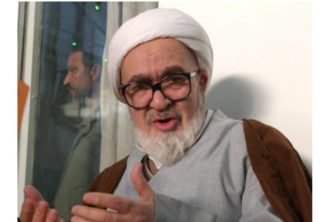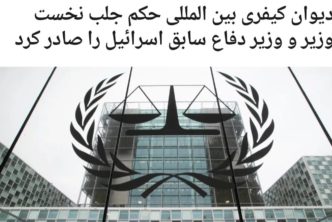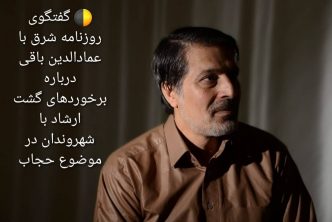A prominent activist in Iran says the West should focus on human rights, not nukes.
Web Exclusive
By Maziar Bahari
Newsweek
Updated: 7:54 p.m. ET Aug. 22, 2006
Aug. 22, 2006 – On Tuesday, Iran said it was ready for “serious negotiations” on its nuclear program, but a semiofficial news agency said the government was unwilling to abandon nuclear enrichment-a key U.S. demand. As the West and Iran move further away from a diplomatic solution over the nuke issue, prominent human-rights activist Emmadeddin Baghi insists that the world’s focus should instead be on the Iran’s human-rights record. Six years ago, Baghi was jailed for three years for writing an article in support of abolishing Iran’s death penalty. Iranian authorities deemed the article un-Islamic. After being released from prison, Baghi has tried to steer clear of politics and concentrated instead on writing books (all of them banned by the government) and human-rights activism, including launching the Society to Support the Rights of Prisoners. NEWSWEEK’s Maziar Bahari recently spoke with Baghi at his office in Tehran. Excerpts:
NEWSWEEK: Has Western pressure on Iran over its nuclear program helped or hindered your human-rights work?
EMMADEDDIN BAGHI: The West, especially the Americans, have to understand that the main problem in Iran is not the nuclear issue but the absence of an active civil society. If we had a strong civil society, it wouldn’t matter if we were a nuclear power. The Americans’ position on Iran’s nuclear issue is absolutely wrong. The nuclear issue is just an excuse for regime change in Iran. As a result, the Iranian government has nothing to lose; it doesn’t budge even an inch because it knows any compromise will lead to other demands. What the West should have done was engage Iran by allowing it to enter the World Trade Organization and by developing economic trade with the Islamic Republic. That would’ve made Iranians and the government feel that they are part of the world community. It would’ve made people more prosperous as well. They’d know that they had something to lose if they insisted on confronting the international community. Right now, they have nothing to lose.
Your old friend, colleague and former cellmate in Tehran’s Evin prison, Akbar Ganji, calls for regime change in Iran. But since your release three years ago, you have worked within the system. How did you decide on two totally different strategies even though you shared the same background and the same cell?
I’m a student of history and try not to repeat the same mistake. I dare say that I used my time in prison quite well. I had time to think of Iran’s history and realized that the main problem with most activists and intellectuals in Iran in the past was that they emphasized changing the individual at the top of the system. They thought that his removal would change the system as well. Yet while the rulers came and went, one after another, the system essentially remained the same: autocratic. I realized that we need a strong civil society and human-rights organizations to be able to hold the government accountable for its actions. It’s not the responsibility of the civil society to ask for regime change—the regime can easily suppress them. I think we should try to avoid confronting the government as much as possible and try to interact with it. Most importantly, human rights organizations should stay out of politics.
The regime in Iran is not only autocratic but also considers itself a divine system. Iran’s supreme leader is supposed to be the successor of the absent Imam or the Messiah of the Shias on earth. How can you work within the parameters such a regime set up for you?
It’s very difficult. Civil society has to be the medium through which people can express their demands and a way for the authorities to understand what is going on in the country. But it’s hard to do it here. I’ll give you an example. In most countries, the only obstacle to abolishing capital punishment is emotional. People think that someone who has committed an abhorrent crime should be executed. But in Iran, the obstacles are ideological. The government and many people believe that an eye for an eye is part of the Sharia, the Islamic law. So if you’re against capital punishment, you’re against the laws of Islam. I wrote an article about capital punishment seven years ago and went to jail for it. But when I came out of jail I started visiting conservative high-ranking clerics and tried to convince them that abolishing capital punishment can be compatible with Islam. This lobbying has somehow been successful. True, it’s an excruciatingly gradual process, but there’s no other way to go forward.
What do you think are the main human-rights problems in Iran?
Number one, executions. Iran has one of the highest numbers of executions in the world. I think the laws should be revised and the number of executions should come down. Number two, the number of charges that can result in arrests and incarceration. We just have too many reasons to indict people. According to a recent survey, up to 50 percent of Iranians are in jail because of drug-related charges. Many of them are drug-addicts. So the addicts instead of being treated in rehabilitation centers as patients, they are put in jail as criminals. Number three, lack of freedom of expression and freedom of press. Number four, the absence of a lawyer for the defendant in different parts of the judicial process. But for an average person these are not the main problems. They are more preoccupied with their day-to-day problems. So as a human-rights activist, I have to close the gap between the activists and the general population.
What are the main human-rights problems for an average Iranian?
Number one, economic inequality. The people are really suffering from unequal distribution of wealth in our country. And that is their main problem. Number two, poor social services. Many of our people are denied basic human-rights, such as health insurance, welfare, retirement benefits, etc. Number three, housing. Many people in Iran are denied this right. Human rights is not only about freedom of expression and political freedom, but it has become politicized. That is the scourge of human-rights movements and organizations around the world. It’s made it really difficult to work as a human-rights activist in Iran. On the one hand, we’re dealing with a government that thinks almost everything should be solved by force. And on other there is a radical opposition that uses human rights as a way to further their political objectives.
Do you mean Iranian groups or foreign organizations and countries?
most of them. Iranian and non-Iranian groups and individuals inside and outside of the country. There are radical activists who just want regime change in Iran but who pretend to care for human rights. A human-rights activist should not be preoccupied with changing the government. They have to defend human rights within the framework of the Law. We have the same problem with foreign governments and organizations.
What do you think about American human-rights record?
It’s hypocritical. Just look at Abu Ghraib, Guantanamo or the recent events in Lebanon. Aren’t the Lebanese civilians human? Don’t they have rights? The Americans had a golden opportunity to fight terrorism after 9/11 but they insisted on wrong policies in Afghanistan, Iraq, Palestine and Iran which somehow made repugnant acts of terrorism somehow acceptable for many people in the Muslim world. Listen, I’ve been imprisoned by the government of Iran. I can’t tell you how much pressure this government has put me under. I sympathize with innocent Israeli civilians who die in rocket attacks. But even someone like me feels humiliated when Condoleezza Rice comes on TV and talks about a new map of the Middle East. Who is she? How can the Americans think they can decide what should be the future for the people of the Middle East? The destiny of our region should be decided by the people of this region not others. Democracy can never be imported. Never.
http://www.msnbc.msn.com/id/14472471/site/newsweek#storyContinued




